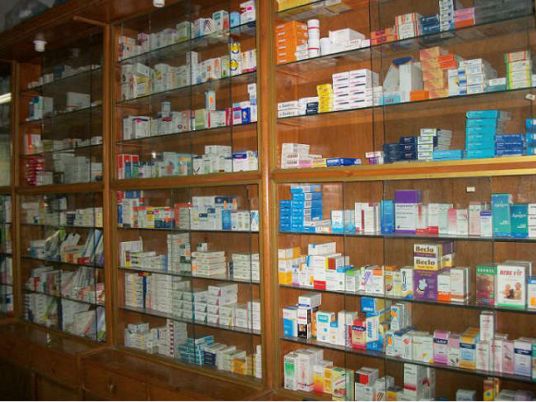
In wake of Egyptian pound flotation, the country is suffering acute shortage of medications, especially those for treatment of leukemia, kidney failure, diabetes, Hepatitis C, blood clotting, muscle atrophy and those constituting hormones.
Children with cancer are suffering severe shortage of Purinethol, a drug used to treat critical lymphocytic leukemia. While kidney failure patients are screaming after several dialysis centers closed their doors due to the shortage in the saline solution along with the increase in the cost of dialysis sessions.
Tarek Khalifa, the manager of Alexandria University Hospital in Alexandria, said that units of dialysis at the hospital will be closed at the end of this month because the solution used in dialysis will be out of stock. “As kidney failure patient, literally we are awaiting death,” said Amr Islameil who used to go through dialysis three times per week, but he was shocked when the head of the unit told him that they are expecting to close due to the shortage of needs.
Speaking exclusively to Egypt Independent, Mohamed Fouad, Head of the Egyptian Center for the Right to Medicine, said there is currently a critical shortfall in at least 210 life-saving drugs in the Egyptian pharmaceutical market. Some of these drugs can still be found on the black market with a 300 percent increase in original price, including drugs for cancer, liver diseases, those needed for operations, anesthetics, diabetes and anti-RH immune globulin injections.
While there are another 1,800 medicines not available in the market as well, they have local alternatives with the same active ingredients. “People are dying every day. A young man died of excessive bleeding in Qasr Al-Ainy hospital because he did not find the blood clotting drugs he needed; the operating theatres are closing because there are no anesthesic drugs; and moreover there are no medications for muscular atrophy for which we have around 800,000 patients in Egypt,” Fouad said.
“The crisis was already looming four months ago and the center released an alarm statement in August, saying that the country is expecting a big crisis of medication shortages, but no one listened,” Fouad said. He explained that the crisis was exacerbated after the decision to float the Egyptian pound: “This crisis previously happened in 1995, 2002 and 2005 due to the changes in the U.S dollar prices as 95 percent of the medication ingredients are imported,” he explained.
Fouad pointed out that companies are importing the ingredients to make the mecidines at the official price of the US dollar in the banks, which recently exceeded LE15, while at the same time they are obliged to sell the medicines at the old price, before the flotation decision at LE 8.75 per US dollar; this means that they will sell at a loss of around 42 percent and no company will accept that sort of loss, especially when there is no evidence of any govermental vision, he said.
A report released by the Cabinet said that the Ministry of Health confirmed that the drug inventories are “reassuring” and that the government is studying the possibility of providing funds that could guarantee the abundance of the drugs in the Egyptian market without any increase in prices; this so as not to put heavier burdens on the Egyptians.
Moreover, the statement pointed that there are negotiations with International pharmaceutical companies to proceed with the distribution of the drugs needed in the Egyptian market.
Despite the government denial of drugs shortage crisis, the member of health committee in the parliament Mahmoud Basiouny confirmed that there is a real shortage crisis in cancer medications: “These drugs topped by Purinethol are indispensable as they are classified as life-saving drugs and their shortage may lead to death. The government should take real actions,” Basiouny told Al-Youm Al-Sabe (Youm7) news.
Meanwhile, Mona Mina, the deputy head of the Doctor Syndicate said that there is a real crisis of shortfall in medications and medical supplies, including the syringes and medical solutions but nobody can prove that because there are no official figures and statistics; but it's the citizen who feel it in reality because the crisis is exacerbating every day.
“The crisis started during the unprecedented increase in U.S dollar price on the black market few months ago because most of the drugs are imported ones,” Mina said. She pointed out that traditionally Egyptian-made medications used to be available, but the government insisted on exporting it to the Arab nations because there was a surplus. However now, the raw material is the only ingredient used and the pharmaceutical company merely transforms it to the medical composition.
“In my opinion this is the main reason for the problem that makes a very important product like the medication subjective to foreign currency intermittent changes, while we already have strong and prestigious pharmaceutical industry,” she said. “We should think about the necessity of medicine as an Egyptian National security and the country should provide its needs to safeguard itself.
Mina believes that the government should consider the crisis and negotiate with the stumbling companies and support them. Moreover, the Egyptian medicine industry as a whole should be supported.
Mina pointed out that the government should survey all the medications that have Egyptian alternatives and those that don’t, and then set aside financial aid from the country to import the essential one because medical drugs are a matter of life and death.
She said that it should include all medical needs such as solutions, syringes and dialysis filters; the government should shed light on the significant reasons behind the deteriorating situations of the pharmaceutical companies and actual solutions should be determined.
While Fouad said that the official who drove the country to this deteriorating drug situation should be punished and the Minister of Health must resign; “How did not country predict that there is shortfall will take place?” Fouad wondered. Fouad moreover gave long and short solutions for the crisis one of them is to move the prices of medications in order to reduce the company’s loss.
On the long-term he pointed that the government should set a strategy for medication policies, declaring social insurance law to guarante the right for all Egyptians especially the poor according to article number 18 in the Egyptian constitution.
Moreover he pointed that the government must establish a pharmaceutical medication institution to set drugs pricing for all the companies and pharmacies based on the costs and a fixed profit margin; “if you drop by any pharmacy you’ll find the same drug with different price from the other pharmacy,” he said.
He added that this institution should do a map for Egyptian patients, their needs and the most spreading critical diseases; “for example the majority of Egyptians suffer from diabetes, Hepatitis C and kidney failure so the medications for these should set as top priority,” Fouad said.




